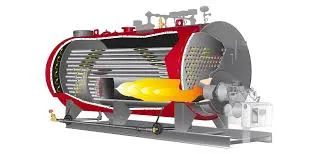
Oct . 15, 2024 16:40 Back to list
hot water boiler expansion tank pressure
Understanding Hot Water Boiler Expansion Tank Pressure
A hot water boiler is an essential component of many residential and commercial heating systems. As water is heated, it expands, and the pressure within the system rises. This is where the expansion tank comes into play. Its primary purpose is to accommodate the extra volume of water generated when it expands, helping to maintain a stable pressure in the system. Understanding the relationship between hot water boiler expansion tank pressure and its functionality is crucial for ensuring efficient operation and preventing system failures.
What is an Expansion Tank?
An expansion tank is typically a small, cylindrical container that is installed in a hot water heating system, either in the boiler room or near the hot water tank. The tank is divided into two sections by a diaphragm or bladder, which is designed to separate the air from the water. The upper part contains air under pressure, while the lower part contains the water from the heating system. As the temperature of the water increases, it expands and enters the expansion tank, pushing against the diaphragm and compressing the air above.
The Importance of Maintaining Proper Pressure
Maintaining the correct pressure within the expansion tank is vital for the overall health of the heating system. If the pressure is too low, the tank may not be able to absorb the water expansion effectively, leading to excessive pressure buildup in the boiler. This situation can potentially cause the boiler's safety relief valve to activate, wasting energy and creating safety risks. Conversely, if the pressure is too high, it can put stress on the system components, leading to leaks, burst pipes, and costly repairs.
Generally, the ideal air pressure in an expansion tank should be set between 12 to 15 psi (pounds per square inch), but this can vary depending on the specific requirements of the heating system. Regular maintenance, including checking the air pressure in the expansion tank, is essential to prevent such issues.
Signs of Problems with the Expansion Tank
hot water boiler expansion tank pressure

Home and business owners should be aware of symptoms that may indicate problems with the expansion tank or system pressure. These may include
1. Increased Water Hammer If you notice loud banging noises in your pipes, it may signify that the system is experiencing changes in pressure that the expansion tank cannot accommodate.
2. Frequent Activation of Relief Valve An alarming increase in the operation of the safety relief valve indicates excessive pressure, which can be a clear indication that the expansion tank is malfunctioning.
3. Water Leakage Puddles or water stains around the boiler or piping may suggest a pressure issue leading to leaks, possibly due to failures in the expansion tank.
4. Underperformance If you notice that your heating system struggles to maintain desired temperatures, it could be related to an issue with maintaining pressure.
Conclusion
Understanding the role of the expansion tank in a hot water boiler system is vital for efficient operation and long-term reliability. Regular checks and maintenance of the tank’s pressure can prevent costly repairs and ensure a safe and effective heating system. By being vigilant and proactive, homeowners and facility managers can prevent pressure-related issues that may compromise the function of their heating systems, ultimately leading to enhanced comfort and peace of mind.
-
High-Efficiency Commercial Oil Fired Steam Boiler for Industry
NewsJul.30,2025
-
High-Efficiency Biomass Fired Thermal Oil Boiler Solutions
NewsJul.30,2025
-
High Efficiency Gas Fired Thermal Oil Boiler for Industrial Heating
NewsJul.29,2025
-
High-Efficiency Gas Fired Hot Water Boiler for Sale – Reliable & Affordable
NewsJul.29,2025
-
High Efficiency Biomass Fired Hot Water Boiler for Industrial and Commercial Use
NewsJul.29,2025
-
High-Efficiency Biomass Fired Hot Water Boiler for Industrial Use
NewsJul.28,2025
Related PRODUCTS






















